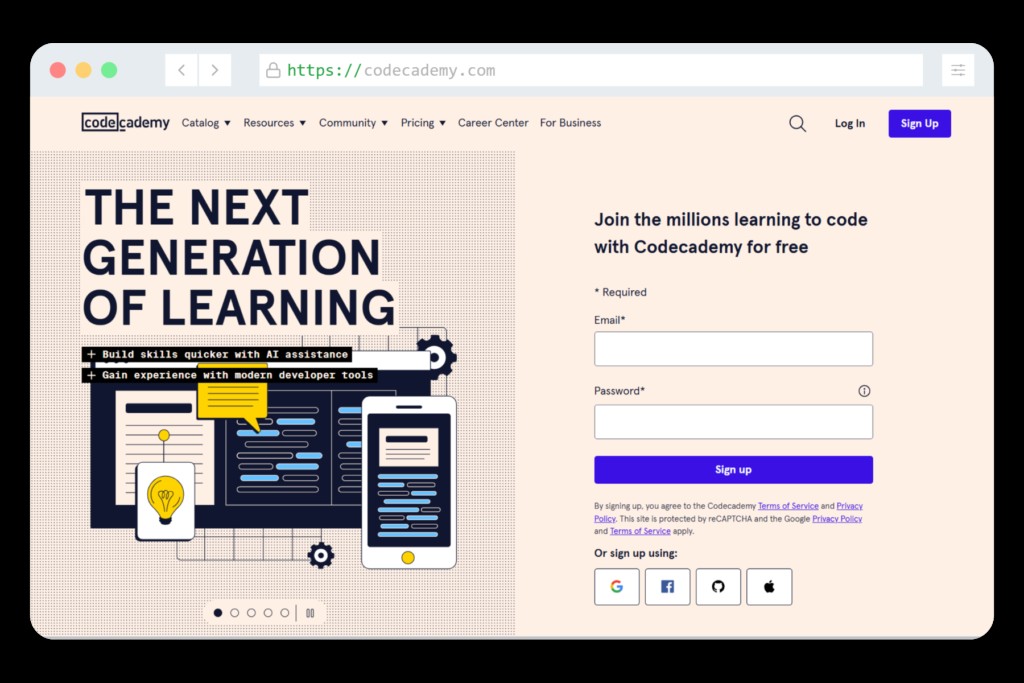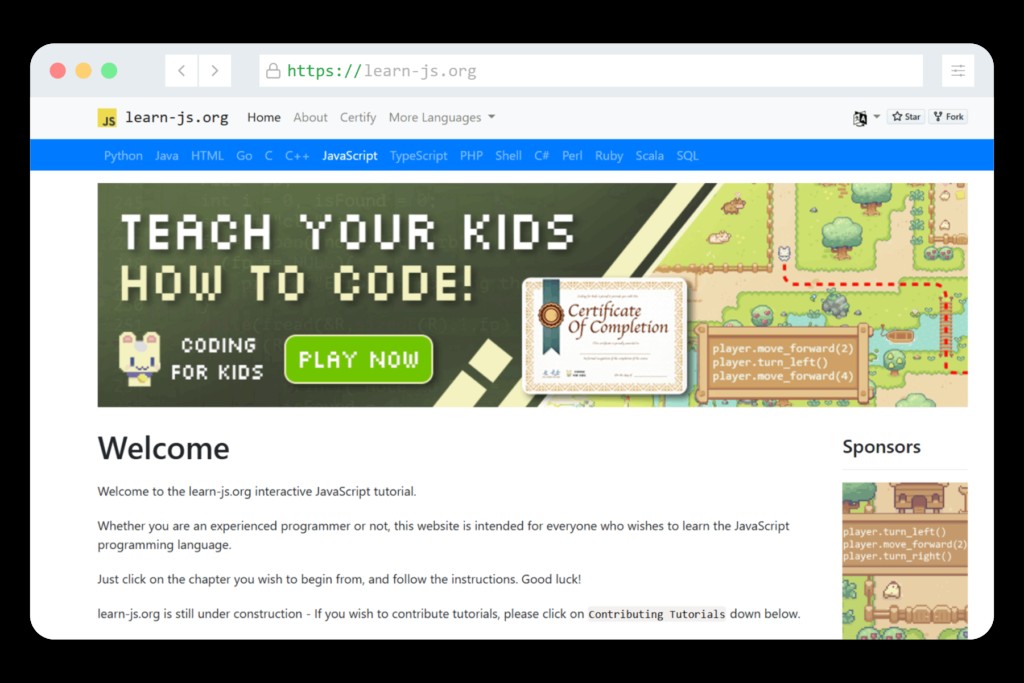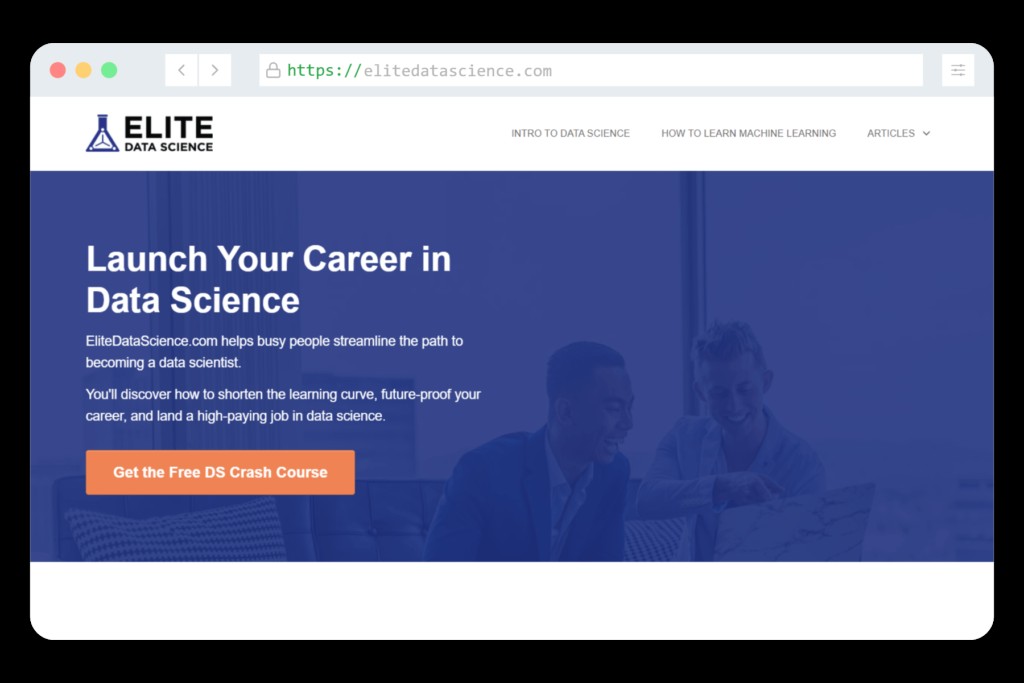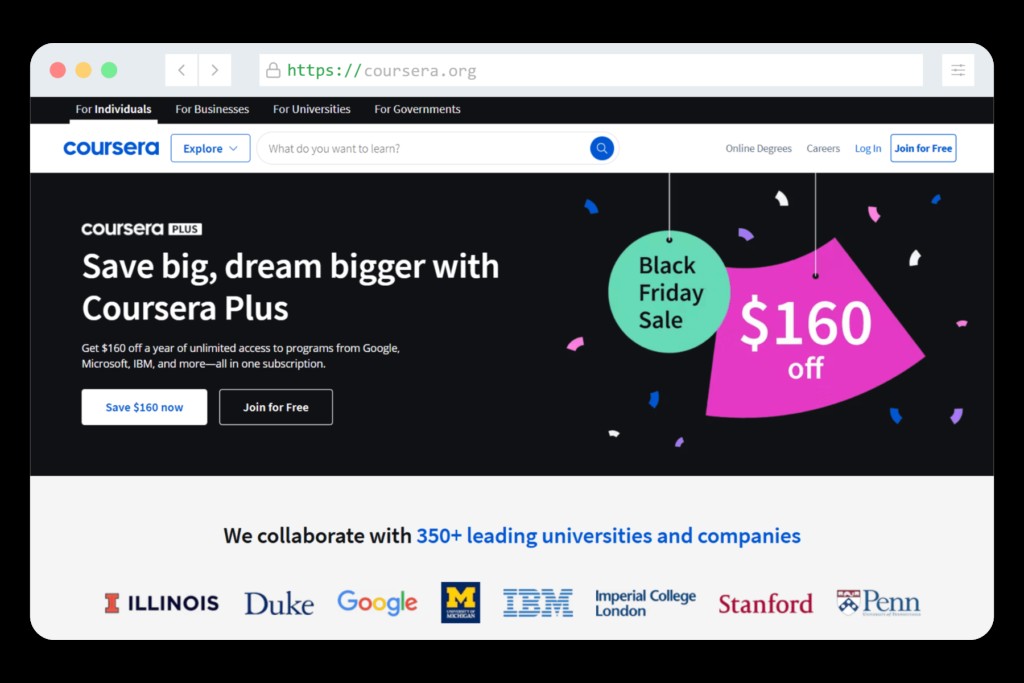Can I Learn To Code For Free? Absolutely! Diving into the world of coding can seem daunting, but with the wealth of free online resources available, it’s more accessible than ever. At LEARNS.EDU.VN, we believe everyone should have the opportunity to acquire valuable tech skills. This guide provides you with the best free resources and strategies to start your coding journey today, leading to potential career changes and personal growth. Explore fundamental programming, web development, and coding education with these resources.
1. Is Learning to Code for Free Possible?
Yes, learning to code for free is absolutely achievable! The internet is brimming with resources that allow anyone, regardless of their financial situation, to acquire coding skills. From interactive tutorials to comprehensive courses, the options are plentiful. All you need is dedication, time, and the willingness to explore the vast landscape of online learning.
- Cost-Effective: Eliminates the financial barrier to entry.
- Flexible Learning: Study at your own pace and on your own schedule.
- Diverse Resources: Access a wide array of tools and platforms.
2. Understanding the Coding Landscape
Before diving into specific resources, understanding the different facets of coding is crucial. Coding is not just about writing lines of code; it involves problem-solving, logical thinking, and creativity. Here’s a glimpse into some essential areas:
- Web Development: Building websites and web applications.
- Software Development: Creating applications for computers and mobile devices.
- Data Science: Analyzing and interpreting complex data using programming.
- Game Development: Designing and developing video games.
Each of these areas requires different skills and programming languages, so choosing one that aligns with your interests and career goals is essential.
3. Essential Programming Languages to Learn
Choosing the right programming language to start with can significantly impact your learning experience. Here are some of the most popular and beginner-friendly languages:
- Python: Known for its readability and versatility, Python is widely used in web development, data science, and artificial intelligence.
- JavaScript: Essential for front-end web development, JavaScript brings interactivity to websites and is also used in back-end development with Node.js.
- HTML/CSS: While not strictly programming languages, HTML and CSS are fundamental for web development. HTML structures the content of a webpage, while CSS styles it.
- Java: A robust and widely used language, Java is often used for enterprise-level applications and Android app development.
- C#: Developed by Microsoft, C# is commonly used for developing Windows applications and games using the Unity game engine.
Selecting a language depends on your interests and what you want to achieve. For example, if you’re interested in web development, starting with HTML, CSS, and JavaScript is a great idea.
4. Free Online Coding Platforms
Many platforms offer free coding courses and resources. These platforms provide structured learning paths and hands-on exercises to help you build your coding skills.
- Codecademy: Offers interactive lessons in various programming languages, including Python, JavaScript, and Java.
- freeCodeCamp: A non-profit organization providing free coding certifications in web development, data science, and more.
- Khan Academy: Provides free coding tutorials and courses for beginners, covering topics like HTML, CSS, and JavaScript.
- edX: Hosts courses from top universities worldwide, including computer science courses that are free to audit.
- Coursera: Similar to edX, Coursera offers a variety of courses from universities and institutions, with many available for free auditing.
- Udemy: Features a wide range of user-created courses, with many free options covering various coding topics.
5. Websites and Resources for Learning HTML & CSS
HTML and CSS are the building blocks of the web. Mastering these languages is crucial for anyone interested in web development.
| Platform/Resource | Description |
|---|---|
| w3schools | Offers comprehensive tutorials and references for HTML, CSS, JavaScript, and other web technologies. |
| HTML.com | Provides a beginner-friendly HTML tutorial covering the basics of HTML syntax and structure. |
| CSS-Tricks | A valuable resource for CSS developers, offering articles, tutorials, and a comprehensive CSS reference. |
| MDN Web Docs | Mozilla Developer Network (MDN) provides extensive documentation and tutorials for web technologies, including HTML, CSS, and JavaScript. |
| MarkSheet | A free HTML and CSS tutorial focused on teaching web standards and best practices. |
| Learn-HTML.org | An online resource that offers step-by-step tutorials and interactive exercises focused on teaching HTML. |
| HTML Dog | Hosts free HTML tutorials, along with examples of HTML, CSS, and JavaScript at work, plus techniques commonly used to build websites. |
| General Assembly Dash | Teaches the basics of HTML, CSS, and JavaScript in a user-friendly and interactive way with the same level of quality as other paid GA classes. |




6. Free Resources to Learn JavaScript
JavaScript is essential for adding interactivity and dynamic behavior to websites. Here are some excellent free resources to learn JavaScript:
- MDN JavaScript: A comprehensive guide to JavaScript, covering everything from the basics to advanced topics.
- JavaScript.com: Offers a personalized tutorial to get you up and running with JavaScript quickly.
- Learn-JS.org: Provides a series of JavaScript tutorials for beginners and experienced programmers.
- Nodeschool.io: Offers open-source workshops on Node.js that you can complete online.
7. Free Resources to Learn Python
Python is a versatile language used in various applications, including web development, data science, and machine learning. These free resources can help you get started:
- Learnpython.org: Offers tutorials, exercises, and examples to cover the fundamental concepts of Python.
- Python-Guide.Org: A comprehensive guide to Python, covering installation, basic syntax, and advanced topics.
- Real Python: Provides tutorials, articles, and video courses covering various Python topics.
8. Mastering Version Control with Git and GitHub
Version control is essential for collaborating on code and managing changes. Git is the most popular version control system, and GitHub is a platform for hosting and collaborating on Git repositories.
- Git Immersion: A free walk-through covering the fundamentals of using Git.
- Try Git: Offers resources for getting comfortable with Git and GitHub, including cheat sheets and tutorials.
- GitHub Learning Lab: Provides lessons created by the GitHub community, covering everything from getting started with GitHub to creating GitHub pages.
9. Utilizing Command Line Interfaces
The command line is a powerful tool for interacting with your computer using text commands. Here are some resources to help you learn:
- Django Girls Introduction to the Command-Line Interface: A free tutorial that can get you up and running with the command line on Windows, OS X, and Linux.
- Command Line Power User: Provides tutorials and tips for using the command line efficiently.
10. Free AI and Machine Learning Resources
Artificial intelligence (AI) and machine learning are rapidly growing fields. Learning the basics can open up new opportunities.
- AI for Everyone from DeepLearning.AI: A non-technical course that provides a broad understanding of AI.
- Google AI: Offers free training on machine learning, with tutorials and guides organized by skill level.
- Machine Learning Mastery: A resource that can help you start learning about machine learning concepts and techniques.
11. Diving Into Data Science
Data science involves analyzing and interpreting complex data using programming and statistical methods.
- Springboard: Offers a variety of online courses on data analysis, data science, and engineering.
- Elite Data Science: Specializes in helping students start new jobs in data, with an introductory crash course that is totally free!
12. Exploring User Experience (UX) Design
User experience (UX) design focuses on creating user-friendly and enjoyable digital products.
- The Encyclopedia of Human-Computer Interaction: A compilation of textbooks covering everything from websites and smartphones to household objects.
- UXPin: Offers an overview of UX-related books on topics like prototyping, wireframing, and mockups.
13. Ruby and Ruby on Rails Resources
Ruby on Rails is a server-side web application framework used in tech.
- Ruby on Rails Tutorial: Learn Web Development with Rails: A free, digital version of a tutorial by Michael Hartl.
- Learn Ruby the Hard Way: A free book that covers essential skills for beginners in programming.
- Ruby Koans: A series of interactive lessons that teach Ruby through the concept of Zen koans.
14. Free PHP Resources
PHP (Hypertext Preprocessor) is an open-source scripting language commonly used for web development.
- PHP The Right Way: Offers free tutorials on learning PHP using best practices.
- Killer PHP: Provides PHP lessons geared towards non-technical users.
15. Mobile App Development
Creating mobile apps is a rewarding skill. Here are resources for both Android and iOS development:
- Android Documentation for App Developers: Best practices and guides directly from Google for Android app development.
- Apple: Start Developing iOS Apps (Swift): Tutorials and documentation for developing iOS apps using Swift.
16. WordPress Development Resources
WordPress is a popular content management system (CMS) used by millions of websites.
- WordPress.com Learn: Tutorials from the WordPress team for leveling up your WordPress skills.
- WordPress.tv: A hub for content related to WordPress development and design, including WordCamps, tutorials, and interviews.
17. Structuring Your Learning Journey
Learning to code for free requires a structured approach. Here’s how to create an effective learning plan:
- Set Clear Goals: Determine what you want to achieve with your coding skills.
- Choose a Learning Path: Select a specific area, such as web development or data science, and focus on the relevant languages and technologies.
- Create a Schedule: Dedicate specific times each day or week to learning and practicing.
- Practice Regularly: Coding is a skill that improves with practice. Work on projects and exercises to reinforce your learning.
- Join a Community: Connect with other learners and experienced developers to ask questions and get support.
- Stay Consistent: Consistency is key to making progress. Stick to your schedule and don’t get discouraged by challenges.
18. Community and Support
Being part of a community can significantly enhance your learning experience. Here are some platforms where you can connect with other coders:
- Stack Overflow: A question-and-answer website for programmers.
- Reddit: Subreddits like r/learnprogramming and r/programming are great for asking questions and sharing resources.
- Discord: Many coding communities have Discord servers where you can chat with other learners in real-time.
- Meetup: Find local coding groups and events in your area.
19. Building a Portfolio
As you learn to code, it’s essential to build a portfolio of projects to showcase your skills to potential employers. Here are some tips for creating a compelling portfolio:
- Start Small: Begin with simple projects and gradually increase complexity.
- Showcase Variety: Include different types of projects to demonstrate your versatility.
- Document Your Code: Write clear and concise comments to explain your code.
- Host Your Projects: Use platforms like GitHub Pages or Netlify to host your projects online.
- Get Feedback: Ask other developers to review your code and provide feedback.
20. Career Opportunities in Coding
Coding skills are in high demand across various industries. Here are some potential career paths:
- Web Developer: Develops websites and web applications.
- Software Engineer: Creates applications for computers and mobile devices.
- Data Scientist: Analyzes and interprets complex data using programming and statistical methods.
- Front-End Developer: Focuses on the user interface and user experience of websites.
- Back-End Developer: Works on the server-side logic and databases of web applications.
- Mobile App Developer: Creates applications for mobile devices.
- Game Developer: Designs and develops video games.
21. Overcoming Challenges
Learning to code can be challenging, but with the right mindset and strategies, you can overcome obstacles.
- Stay Patient: Coding takes time and effort. Don’t get discouraged by setbacks.
- Break Down Problems: Break complex problems into smaller, more manageable tasks.
- Seek Help: Don’t be afraid to ask for help from online communities or mentors.
- Celebrate Progress: Acknowledge and celebrate your achievements along the way.
22. Staying Updated
The world of coding is constantly evolving, so staying updated with the latest trends and technologies is essential.
- Follow Blogs and Newsletters: Subscribe to blogs and newsletters that cover coding and technology.
- Attend Conferences and Webinars: Participate in industry events to learn about new technologies and network with other professionals.
- Contribute to Open Source: Contribute to open-source projects to gain experience and stay current with industry practices.
23. Additional Free Resources
Here are some additional free resources that can help you on your coding journey:
- MIT OpenCourseWare: Provides free access to course materials from MIT, including computer science courses.
- Upskill: Offers a library of coding classes, and their Essential Web Development Course is free forever (with email signup) and includes lessons on full-stack web development using HTML, CSS, JavaScript, and Ruby on Rails.
- Microsoft Virtual Academy: A free resource for learning to use Microsoft tools like Azure and .NET.
- General Assembly Dash: Teaches the basics of HTML, CSS, and JavaScript in a user-friendly and interactive way with the same level of quality as other paid GA classes.
24. The Importance of Continuous Learning
Learning to code is a continuous journey. As you gain experience, continue to explore new languages, frameworks, and technologies. Embrace challenges and view them as opportunities for growth.
25. Expert Tips for Effective Learning
To make the most of your free coding education, consider these expert tips:
- Learn by Doing: Focus on hands-on projects and exercises to reinforce your understanding.
- Set Realistic Goals: Break down your learning into manageable steps and set achievable goals.
- Find a Mentor: Seek guidance from experienced developers who can provide support and advice.
- Teach Others: Teaching others is a great way to solidify your knowledge and identify gaps in your understanding.
- Stay Motivated: Remember why you started learning to code and focus on the long-term benefits.
26. Emerging Technologies to Watch
As you progress in your coding journey, keep an eye on emerging technologies that are shaping the future of the industry.
- Artificial Intelligence (AI): AI is transforming various industries, and coding skills are essential for developing AI-powered applications.
- Blockchain: Blockchain technology is revolutionizing finance, supply chain management, and other sectors.
- Cloud Computing: Cloud platforms like AWS, Azure, and Google Cloud are becoming increasingly important for deploying and managing applications.
- Internet of Things (IoT): IoT involves connecting devices to the internet, and coding skills are needed to develop IoT applications.
27. Utilizing LEARNS.EDU.VN for Continued Growth
LEARNS.EDU.VN is dedicated to providing accessible and high-quality education to learners of all levels. Our platform offers a variety of resources, including:
- Detailed Guides: Comprehensive articles and tutorials on various coding topics.
- Effective Learning Methods: Proven strategies and techniques for maximizing your learning potential.
- Simplified Explanations: Clear and intuitive explanations of complex concepts.
- Structured Learning Paths: Clear roadmaps for learning specific skills and technologies.
- Useful Tools and Resources: A curated collection of tools and resources to support your learning journey.
28. Addressing Common Concerns
- Time Commitment: Learning to code takes time, but you can make progress by dedicating even a few hours each week.
- Lack of Structure: Use structured learning paths and create a schedule to stay on track.
- Overwhelming Information: Focus on one language or technology at a time to avoid getting overwhelmed.
- Difficulty Understanding Concepts: Break down complex concepts into smaller parts and seek help when needed.
- Staying Motivated: Set clear goals, track your progress, and celebrate your achievements.
29. Real-World Examples and Success Stories
Many people have successfully learned to code for free and transformed their careers. Here are a few examples:
- Jane Doe: A former teacher who learned to code using free online resources and now works as a web developer.
- John Smith: A career changer who acquired data science skills through free courses and now works as a data analyst.
- Emily Brown: A self-taught programmer who built a successful mobile app using free tutorials and documentation.
30. Frequently Asked Questions (FAQs)
- Can I really learn to code for free? Yes, with the vast amount of online resources available, learning to code for free is entirely possible.
- What programming language should I start with? Python is often recommended for beginners due to its readability and versatility.
- How much time do I need to dedicate to learning to code? Even a few hours per week can lead to progress, but consistency is key.
- Do I need a computer science degree to get a coding job? No, many employers value skills and experience over formal education.
- How can I build a portfolio without professional experience? Work on personal projects and contribute to open-source projects to showcase your skills.
- What are the most in-demand coding skills? Web development, data science, and mobile app development are currently in high demand.
- How can I stay motivated while learning to code? Set clear goals, track your progress, and join a supportive community.
- What is the best way to practice coding? Work on projects, solve coding challenges, and contribute to open-source projects.
- How do I choose the right free coding resources? Look for resources with structured learning paths, hands-on exercises, and community support.
- Is it necessary to pay for coding courses to get a job? Not necessarily, but paid courses can provide more structured learning and career support.
31. Your Next Steps
Embarking on your coding journey is an exciting step towards acquiring valuable skills and opening up new opportunities. Here’s a clear path to get you started:
- Explore LEARNS.EDU.VN: Dive deeper into our articles and tutorials to gain a solid foundation in coding concepts.
- Choose a Programming Language: Select a language that aligns with your interests and career goals.
- Sign Up for a Free Course: Enroll in a free online coding course on platforms like Codecademy, freeCodeCamp, or Khan Academy.
- Join a Coding Community: Connect with other learners and experienced developers on platforms like Stack Overflow, Reddit, or Discord.
- Start Building Projects: Put your skills into practice by working on personal projects and contributing to open-source projects.
32. Call to Action
Ready to start your coding journey? Visit LEARNS.EDU.VN to explore our comprehensive guides and discover the resources you need to succeed. Whether you’re interested in web development, data science, or mobile app development, we have the information and support you need to achieve your goals.
For further information or assistance, contact us at:
- Address: 123 Education Way, Learnville, CA 90210, United States
- WhatsApp: +1 555-555-1212
- Website: learns.edu.vn
Unlock your potential and transform your future with the power of coding. Start learning today!
